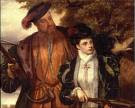"Children stood by in absolute silence" during meals. That would be miraculous, but also unnatural and unrealistic as most of Utopia is. Also, Utopians cannot leave their district without permission and are "severely" punished if they try to do so. I would call this oppression, not freedom or equality.
"Their religious principles are of this nature: that the soul of man is immortal, and by God's goodness born for happiness; after this life, rewards are appointed for our virtues and good deeds, punishments for our sins." A form of Christianity.
OK, now it gets weird!
Thomas More was a devout Catholic, so this next passage was a little shocking. "But if the disease is not only incurable, but excruciatingly and continually painful, then the priests and public officials come and urge the invalid not to endure such agony any longer. They remind him that he is now unfit for any of life's duties. a burden to himself and to others; he has really outlived his own death...life is simply torture and the world a mere prison cell...death puts an end not to pleasure, but to agony. Those who have been persuaded by these arguments either starve themselves to death or take a potion which puts them painlessly to sleep..." This argument is used by proponents of euthanasia and assisted suicide; of which the Catholic Church teaches are mortal sins, (deserving of Hell). One must respect life, and not end it, from conception to natural death. (Catechism of the Catholic Church 2270, 2277, 2280). Again, frighteningly relevant to the 21st century.
Weird item #2: Utopians follow a custom which is indeed "foolish and absurd in the extreme", not to mention pretty shallow; "the bride-to-be is shown naked to the groom by a responsible and respectable matron: and, similarly, some respectable man presents the groom naked to his future bride." He then compares this practice to inspecting a horse and uncovering a "hidden sore". He warns against hating one's spouse for the rest of one's life based on surprises that may be hidden by clothing. This reminds me of something a 14 or 15 year-old person would say, thinking he or she was being very philosophical and articulate.
One last observation: More states that Utopia does not need lawyers, (whom he criticizes extensively) - and he is a lawyer in "real" life.
This book, in my opinion, is a political discourse about everything that was wrong with life in England, (and human nature), as Thomas More knew it. This "pie-in-the-sky" tale, (unrealistic as it is), is simply how he would like for life to be if he were in charge.
The End
Subscribe to:
Post Comments (Atom)











No comments:
Post a Comment